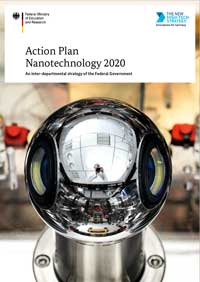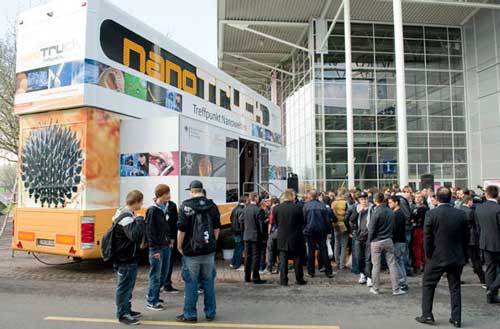| Posted: Nov 22, 2016 | |
Germany's Nanotechnology 2020 Action Plan |
|
| (Nanowerk Spotlight) Applications based on nanotechnology have become ever more significant economically in the past few years. They have become commonplace in the everyday lives of workers and consumers. Nanotechnology-based product innovations play an increasingly important role in many areas of life, such as health and nutrition, the workplace, mobility and energy production. | |
 The "Action Plan Nanotechnology 2020" introduces the Federal Government’s inter-departmental support strategy for nanotechnology in the period 2016–2020. It thus pursues the objective of continuing to exploit the opportunities and potential of nanotechnology in Germany, without disregarding any potential risks to humans and the environment. Alongside exploitation of the opportunities from nanotechnological developments, its political activities are equally determined by safe and environmentally responsible application of this technology. Under the leadership of the Federal Ministry of Education and Research (BMBF), the Federal Ministry of Labour and Social Affairs (BMAS), the Federal Ministry of Food and Agriculture (BMEL), the Federal Ministry of Health (BMG), the Federal Ministry for the Environment, Nature Conservation, Building and Nuclear Safety (BMUB), the Federal Ministry of Defence (BMVg) and the Federal Ministry for Economic Affairs and Energy (BMWi) are involved in the Action Plan Nanotechnology 2020. The Action Plan Nanotechnology 2020, in addition to a description of the status quo of national nanotechnology, for the first time after 10 years of inter-ministerial cooperation a conclusion is drawn on the progress that has been achieved from the point of view of the participating ministries, where potential gaps can be identified and therefore the need for action is derived with respect to future activities. |
|
| The Action Plan Nanotechnology 2020 is geared towards the priorities of the Federal Government’s new High-Tech Strategy (HTS), which has as its objective the solution of societal challenges by promoting research. It will play its part in the fulfilment of the Federal Government’s strategic objectives with a view to the use of key technologies to increase the international competitiveness of the German economy and for the benefit of society. | |
| The 64-page document lays out the strategic goals of the Federal Government and describes the status quo of nanotechnology in Germany with a list of major players. | |
| The report also contains an overview of funding programs with a list of specialist federal government programs, funding structures, research organizations and departmental research institutes. Motivating start-ups and research facilities, even at an early stage of innovation is a key focus. | |
| A large section of the plan is dedicated to the issue of EHS (environment, health, safety) nanomaterial risks. | |
| Legislation and regulation is addressed in the context of creating framework conditions for sustainable innovations. | |
 |
|
| The German nanoTruck initiative provided information about the applications of nanotechnology. | |
| The implementation of transparent and open communication, especially about findings from risk research, plays an integral role in facilitating the acceptance and confidence in nanoproducts on the part of consumers. | |
| Finally, the entire effort is put in context of international activities, especially Germany's involvement in EU funding programs. | |
 By
Michael
Berger
– Michael is author of three books by the Royal Society of Chemistry:
Nano-Society: Pushing the Boundaries of Technology,
Nanotechnology: The Future is Tiny, and
Nanoengineering: The Skills and Tools Making Technology Invisible
Copyright ©
Nanowerk LLC
By
Michael
Berger
– Michael is author of three books by the Royal Society of Chemistry:
Nano-Society: Pushing the Boundaries of Technology,
Nanotechnology: The Future is Tiny, and
Nanoengineering: The Skills and Tools Making Technology Invisible
Copyright ©
Nanowerk LLC
|
|
|
Become a Spotlight guest author! Join our large and growing group of guest contributors. Have you just published a scientific paper or have other exciting developments to share with the nanotechnology community? Here is how to publish on nanowerk.com. |
|
